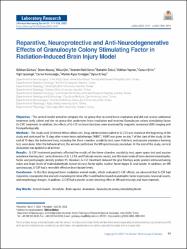Reparative, Neuroprotective and Anti-Neurodegenerative Effects of Granulocyte Colony Stimulating Factor in Radiation-Induced Brain Injury Model
Erişim
info:eu-repo/semantics/openAccessTarih
2023Yazar
Gürkan, GökhanAtasoy, Özüm
Cini, Nilsu
Sever, İbrahim Halil
Özkul, Bahattin
Yaprak, Gökhan
Şirin, Cansın
Uyanıkgil, Yiğit
Kızmazoğlu, Ceren
Erdoğan, Mumin Alper
Erbaş, Oytun
Üst veri
Tüm öğe kaydını gösterKünye
Gürkan, G., Atasoy, Ö., Çini, N., Sever, İ. H., Özkul, B., Yaprak, G., Şirin, C., Uyanıkgil, Y., Kızmazoğlu, C., Erdoğan, M. A., & Erbaş, O. (2023). Reparative, Neuroprotective and Anti-neurodegenerative Effects of Granulocyte Colony Stimulating Factor in Radiation-Induced Brain Injury Model. Journal of Korean Neurosurgical Society, 66(5), 511–524. https://doi.org/10.3340/jkns.2023.0049Özet
Objective : This animal model aimed to compare the rat group that received brain irradiation and did not receive additional treatment (only saline) and the rat group that underwent brain irradiation and received Granulocyte colony stimulating factor (G-CSF) treatment. In addition, the effects of G-CSF on brain functions were examined by magnetic resonance (MR) imaging and histopathologically.Methods : This study used 24 female Wistar albino rats. Drug administration (saline or G-CSF) was started at the beginning of the study and continued for 15 days after whole-brain radiotherapy (WBRT). WBRT was given on day 7 of the start of the study. At the end of 15 days, the behavioral tests, including the three-chamber sociability test, open field test, and passive avoidance learning test, were done. After the behavioral test, the animals performed the MR spectroscopy procedure. At the end of the study, cervical dislocation was applied to all animals.Results : G-CSF treatment positively affected the results of the three-chamber sociability test, open-space test and passive avoidance learning test, cornu Ammonis (CA) 1, CA3, and Purkinje neuron counts, and the brain levels of brain-derived neurotrophic factor and postsynaptic density protein-95. However, G-CSF treatment reduced the glial fibrillary acidic protein immunostaining index and brain levels of malondialdehyde, tumor necrosis factor-alpha, nuclear factor kappa-B, and lactate. In addition, on MR spectroscopy, G-CSF had a reversible effect on brain lactate levels.Conclusion : In this first designed brain irradiation animal model, which evaluated G-CSF effects, we observed that G-CSF had reparative, neuroprotective and anti-neurodegenerative effects and had increased neurotrophic factor expression, neuronal counts, and morphology changes. In addition, G-CSF had a proven lactate-lowering effect in MR spectroscopy and brain materials.

















